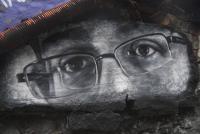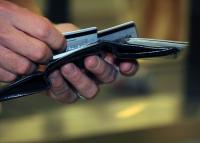-
You are not as anonymous online as you may think
Hiding online is harder than you would have thought. You may not be anonymous as you think you are online, reveals a new study. Your browsing behavior can indicate your personality and provide a unique digital signature which can identify you, sometimes after just 30-minutes of browsing.
-
-
Snowden performed “public service” but should be punished: Eric Holder

Eric Holder, the former U.S. Attorney General, has said Edward Snowden performed a “public service” by triggering a debate over surveillance techniques. Holder added, however, that he believed Snowden should be punished for leaking classified intelligence information which threatened U.S. national security.
-
-
We know where you live
Researchers have shown that the location stamps on just a handful of Twitter posts — as few as eight over the course of a single day — can be enough to disclose the addresses of the poster’s home and workplace to a relatively low-tech snooper. The tweets themselves might be otherwise innocuous — the location information comes from geographic coordinates automatically associated with the tweets.
-
-
Telephone metadata can reveal surprisingly sensitive personal information
Most people might not give telephone metadata – the numbers you dial, the length of your calls – a second thought. Some government officials probably view it as similarly trivial, which is why this information can be obtained without a warrant. Researchers show, however, that telephone metadata – information about calls and text messages, such as time and length – can alone reveal a surprising amount of personal detail. The work could help inform future policies for government surveillance and consumer data privacy.
-
-
Snowden revelations led to “chilling effect” on pursuit of knowledge: Study
National Security Agency (NSA) whistleblower Edward Snowden’s 2013 mass surveillance revelations caused a drop in website browsing, particularly in internet searches for terms associated with extremism, an example of the most direct evidence yet that the spying operations exposed in the leak had a “chilling effect” on the lawful pursuit of information, an impending report has found.
-
-
Location data on two apps enough to identify someone: Study

Stripping a big data set of names and personal details is no guarantee of privacy. Previous research has shown that individual shoppers, Netflix subscribers, and even taxicab riders are identifiable in heaps of supposedly anonymous data. Now, a team of computer science researchers has identified new privacy concerns by demonstrating that geotagged posts on just two social media apps are enough to link accounts held by the same person.
-
-
Privacy advocacy groups ask NSA to halt changes to data sharing rules
More than thirty organizations sent a letter to the Director of National Intelligence and the Director of the National Security Agency, urging them to halt reported changes to the rules governing when and how the NSA can share the data it collects through overseas surveillance.
-
-
Apple versus FBI: All Writs Act’s age should not bar its use
A federal magistrate judge in California has issued a warrant ordering Apple to assist the FBI in accessing data on an iPhone used by a suspect in the December 2015 San Bernardino mass shooting. Apple’s public refusal to comply with the order – and its motion asking a judge to reverse the order – have set up a legal showdown that has captivated the technology world. It’s hard not to think that marketing and economics are at least somewhat behind Apple’s actions. But my guess is most people understand that the FBI would not be getting into their phones without a probable cause search warrant. In addition, I would think Apple would not want to have a market composed of people who want to use iPhones for dangerous and illegal activity. The company might actually lose more future customers because of its uncooperative attitude than it would ever lose by helping the government by complying with a court order.
-
-
App warns users when they are about to give away sensitive information online
Researchers are seeing potential in a software application which could effectively warn users when they are about to give away sensitive personal information online. The eye tracker detects where a user’s eyes are at the computer screen and records how long they gazed at that spot. The app uses these two functions to find when a user’s eyes remain on a request for sensitive personal information.
-
-
In FBI versus Apple, government strengthened tech’s hand on privacy
The ongoing fight between Apple and the FBI over breaking into the iPhone maker’s encryption system to access a person’s data is becoming an increasingly challenging legal issue. This case is very specific, and in this narrow case, Apple and law enforcement agencies will likely find a compromise. However, this question is not going away anywhere. With the “Internet of things” touted as the next big revolution, more and more devices will capture our very personal data – including our conversations. This case could be a precedent-setting event that can reshape how our data are stored and managed in the future.
-
-
More Americans support Justice Dept. than Apple in locked iPhone dispute
As the standoff between the Department of Justice and Apple Inc. continues over an iPhone used by one of the suspects in the San Bernardino terrorist attacks, 51 percent say Apple should unlock the iPhone to assist the ongoing FBI investigation. Fewer Americans (38 percent) say Apple should not unlock the phone to ensure the security of its other users’ information; 11 percent do not offer an opinion on the question.
-
-
Passwords, privacy and protection: can Apple meet FBI’s demand without creating a ‘backdoor’?
The point of encryption is to make decryption hard. However, hard does not mean impossible. The FBI could decrypt this data, with sufficient effort and computational power, and they could do this with no help from Apple. However, this route would be expensive, and would take some time. In effect, what they’re requesting of Apple is to make their job easier, cheaper and faster. Ultimately, how this matter gets resolved may depend more on the big-picture question of what privacy rights we as a society want for the data we record on our personal devices. Understanding the technical questions can inform this discussion.
-
-
How mobile ads leak personal data
The personal information of millions of smartphone users is at risk due to in-app advertising that can leak potentially sensitive user information between ad networks and mobile app developers, according to a new study.
-
-
Detecting hidden malicious ads hidden in apps
The danger of acquiring a computer virus or spyware used to come with the risk of visiting the dark, sketchy corners of the Internet. But now trusted and harmless smartphone apps like MyFitnessPal and Candy Crush carry their own risks. As more and more people own smartphones, the number of malicious ads hidden in apps is growing — tripling in just the past year.
-
-
Snowden ready to return to U.S. for “fair trial”
Edward Snowden has told friends and supporters he was ready to return to the United States if he could be guaranteed a fair trial. Snowden said his representatives had approached the U.S. Justice Department in an effort to negotiate a plea deal, even one involving him spending time in jail. He told the BBC Panorama last year, however, that the Justice Department had made no effort to respond.
-
- All
- Regional
- Water
- Biometrics
- Borders/Immig
- Business
- Cybersecurity
- Detection
- Disasters
- Government
- Infrastructure
- International
- Public health
- Public Safety
- Communication interoperabillity
- Emergency services
- Emergency medical services
- Fire
- First response
- IEDs
- Law Enforcement
- Law Enforcement Technology
- Military technology
- Nonlethal weapons
- Nuclear weapons
- Personal protection equipment
- Police
- Notification /alert systems
- Situational awareness
- Weapons systems
- Sci-Tech
- Sector Reports
- Surveillance
- Transportation
Advertising & Marketing: advertise@newswirepubs.com
Editorial: editor@newswirepubs.com
General: info@newswirepubs.com
2010-2011 © News Wire Publications, LLC News Wire Publications, LLC
220 Old Country Road | Suite 200 | Mineola | New York | 11501
Permissions and Policies
Editorial: editor@newswirepubs.com
General: info@newswirepubs.com
2010-2011 © News Wire Publications, LLC News Wire Publications, LLC
220 Old Country Road | Suite 200 | Mineola | New York | 11501
Permissions and Policies
